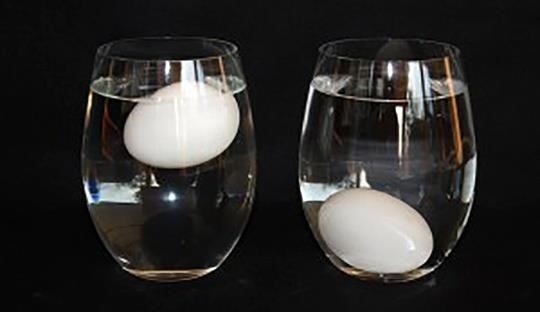There are several ways of knowing if an egg is good after you have cracked it for frying or other purposes. The colour of the egg white and the yolk, the smell and other factors can be determined the level of freshness or how bad an egg has gone.
Never attempt to consume egg that had changed colour or smells — you don’t want to witness the consequences, let alone experience if first hand. That said, what if you want to boil your egg? Is there or are there ways for checking the freshness of eggs before you boil them.
Sometimes, you go to the open market where eggs are stored at normal ambient temperature instead of the refrigerator and you want to know if the eggs are still good before you spend your hard-earned money to buy them. You don’t want to buy them and get home to discover they have gone bad.
I am going to share with you, tips that I have used, and that I still use to know if eggs are still good before I buy them. They have always worked for me. Try them out and share your experiences with other readers of this article.
Tips for checking the freshness of egg before cracking it open
1. The Shake shake test!
You have to be careful when doing this when you are buying in some markets if you don’t want to receive showers of abuses from the sellers. With this test you just need to take some samples randomly from the crates and shake lightly. When you do that, you can tell if the content is still very viscous or gone watery.
I usually don’t take the watery ones because I believe it is an indication they have been around for a longer period, even if they are not spoilt yet.
Another important thing to do when using this method is to make sure you select your samples randomly. This is to make your samples representative of the whole lot. Take from the front, middle and back — you know sellers can mix fresh ones with the not-so-fresh ones.
2. The Egg-in-Water Test or The Float Test
This test cannot be performed in the market. I doubt if any seller would allow you to perform this test on eggs before you purchase them. So, this is only suitable for checking egg freshness at home. You might want to ask, “why do I need this test after buying?”
Okay, let us say you want to fry 3 eggs or mix an egg with other ingredients like flour to make cake or something, you have to be sure each egg is fine. What if you have cracked and mixed two fine eggs together and the third one you crack inside turns bad? You have wasted 3 eggs!
Fill a bowl with cold water and place your eggs in the bowl and allow them to stay for some seconds. Then observe how the eggs behave in the water. There are three possibilities.
Float Test Continued
If they sink to the bottom and lay flat on their sides, then you have bought very fresh eggs. If they have been stored for a few weeks but still good to eat, they’ll stand on one end at the bottom of the bowl.
However, If they float to the surface, they’re no longer fresh enough to eat. So, you may not want to risk cracking them open. The smell can be pungent and very repulsive if they have really changed the smell and color. I’ve been through that before — I couldn’t eat eggs for months after.
3. The Candling Method
The Candling method is not really straightforward as the others and it is the method that should normally be used for testing egg quality before putting eggs for sale in the market. It can, however, be used to determine the freshness of eggs too.
To do this, just put on a flashlight and hold right next to the eggshell to light up the inside. Although a sort of pinhole camera is normally used, the flashlight works fine for home use. When you flash the light, you can see the air space to determine if the egg is fresh or not (image below).
With the candling technique, you could have any of the following; a fresh egg (little air space, slightly visible yolk), a slightly old egg (larger air space, slightly darker yolk), a nearly bad egg (really dark yolk, spotty), and a spoiled egg (mixed in yolk, lots of dark).
Finally, let me say this that no matter which tests we try to carry out on eggs before cracking them, the best will remain cracking them open to check the colour and odour. Those listed here, however, will ensure that we get eggs that are still good and can be consumed.
ALSO SEE: Do Eggs Need To Be Refrigerated Or Just Stored At Room Temperature?




0 Comments